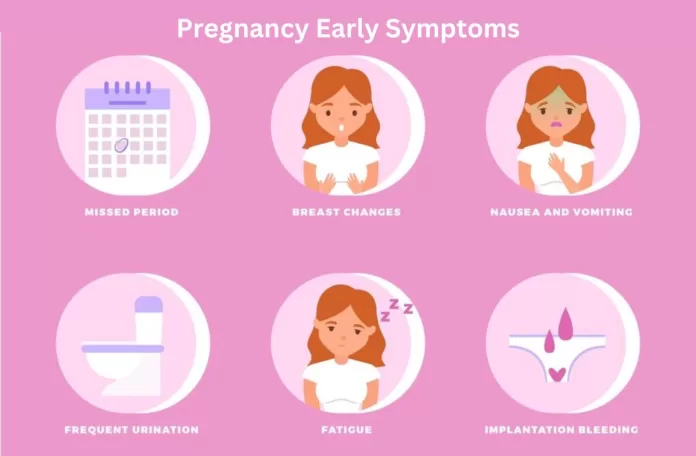The best way to know if pregnant is to take a pregnancy test and be aware of early pregnancy symptoms.
Table of Contents
Early signs and symptoms before a missed period
Knowing what to look for in the first two weeks after conception or perhaps within the first month helps the woman know whether implantation is successful.
Earliest signs of pregnancy in the first 2 weeks
Is it possible to know if the woman has conceived in the first week. Few women can tell within a few days of conception. Others will experience the earliest indicators two weeks after conception.
While these are a few of the symptoms of pregnancy in the first two weeks until the missed period, it is expected that the woman will start experiencing a few of these feelings.
What to expect before a missed period?
Missing a period may or may not mean the woman is pregnant. There are several reasons for this, including medications, hormonal imbalance, weight loss or gain, illness, stress, or even thyroid disorder.
Missing menstruation for women who happen to be sexually active and not on birth control is usually suspected to be caused by pregnancy. If not sure, then check for early signs that can indicate conception.
1. Sore breasts
Sore breasts are the earliest signs the woman will notice. It does start to occur around the 3rd week to the 7th week. In a few women, breast tenderness or swollen breasts and nipples can last through the first trimester.
- One’s boobs might feel heavier and a little bigger than usual.
- The woman may experience a little heaviness in the breasts.
- The areolas darken, and veins can show around one’s chest.
- Nipples may feel tingly and also more sensitive to touch.
These symptoms are usually caused by heightened levels of the progesterone hormone. The body starts to adapt to it, and as a result, it can also retain a little more water than usual.
Breast tenderness can make wearing a bra a little bit uncomfortable. Ease the discomfort by, of course, wearing a supportive bra. Do this when exercising as well as when going to bed.
2. Fatigue (exhaustion)
Fatigue is there in the first trimester.

Even in the first two weeks after conception, the woman can start to feel unusually tired. The extra progesterone in her body may strain her body a little, leaving her feeling tired.
3. Shortness of breath
Shortness of breath is felt. Sudden gasping for air is also known as dyspnea. Shortness of breath is an intense feeling of a tightened chest or perhaps a feeling of suffocation.
The woman may experience episodes of shortness of breath when doing tasks or even exercises that she normally does with ease.
As soon as the woman gets pregnant, her body needs more oxygen and blood to support the growth and development of the baby.
- During this time, the body is still adapting to the increased demand for oxygen.
- Sharing one’s oxygen can leave the woman short of her normal demand, leading to the feeling of suffocation.
One of the first signs of being pregnant right from the beginning is getting sudden episodes of hunger for air.
Also read, Exercise during Pregnancy: Is It Safe?
4. Dizziness
Feeling dizzy might mean the woman is pregnant. Dizziness is indeed a feeling of lightheadedness. It does feel like the woman is about to faint. It can rather go away as soon as the person lies down for a few minutes. If suddenly complaining that a person does feel dizzy before one’s period, it could be that the woman is pregnant.
- While dizziness is a common early sign in the first month of pregnancy, it rarely leads to fainting.
- In the Victorian era, dizziness was indeed considered to be the first physical sign a woman was pregnant.
Blood shifts in one’s body when changing position and can also cause dizziness or lightheadedness. If it leads to fainting several times, seeing a doctor helps.
Later in pregnancy, feeling lightheaded can be caused by low blood sugar due to reduced appetite (from nausea) and also vomiting.
5. Headaches in the first weeks of pregnancy
Basic triggers of the early signs of pregnancy are no doubt dehydration and stress on one’s body. The hormone progesterone can rather cause an increase in blood flow that can, in turn, stress one’s body.
- Adjusting to the new pregnancy can be challenging for the body. The resultant stress can cause headaches.
- Headaches are more common within the first 12 weeks of a pregnancy.
Occasional headaches can persist later in one’s term. They are often caused by increased hunger as the baby puts a strain on one’s body for nutrients. Other causes do include emotional, and also physical stress, sinus congestion, etc.
If the headaches persist longer than four hours, seeing a doctor is better, especially if they are accompanied by other experiences like a puffy face, poor vision or blurred vision, weight gain, etc. Women who usually have migraines are indeed more likely to get headaches during pregnancy.
Other symptoms are a bloated feeling, nausea, vaginal discharge, diarrhea, mood swings, constipation, raised temperature, morning sickness, spotting or light bleeding, and so forth. These early pregnancy symptoms can predict pregnancy.

